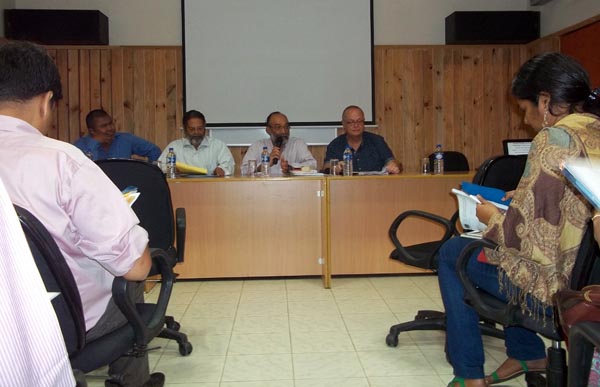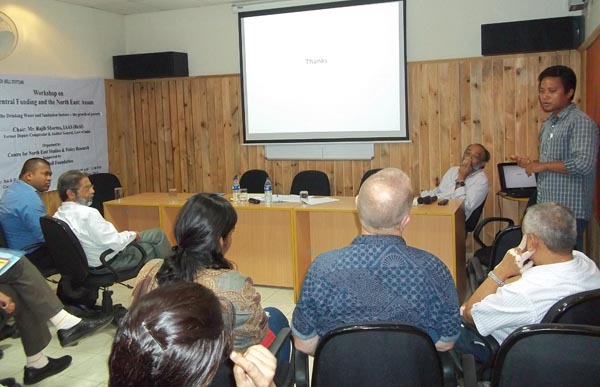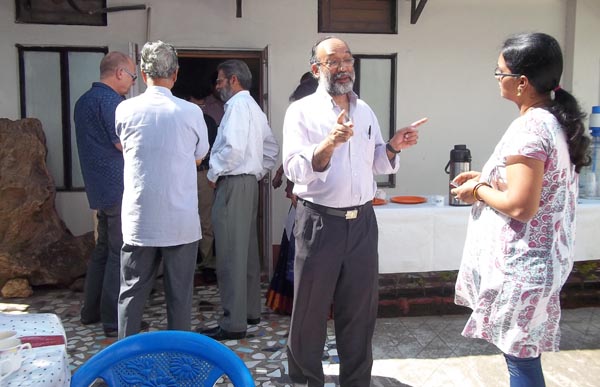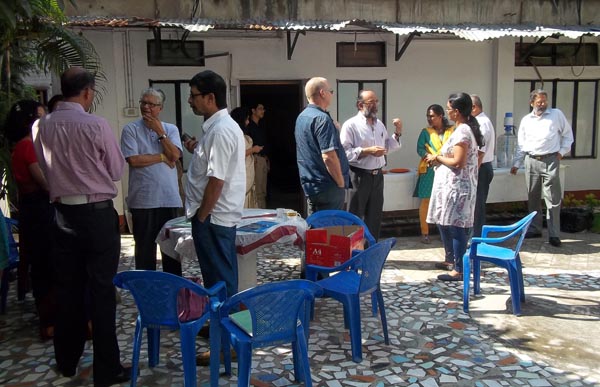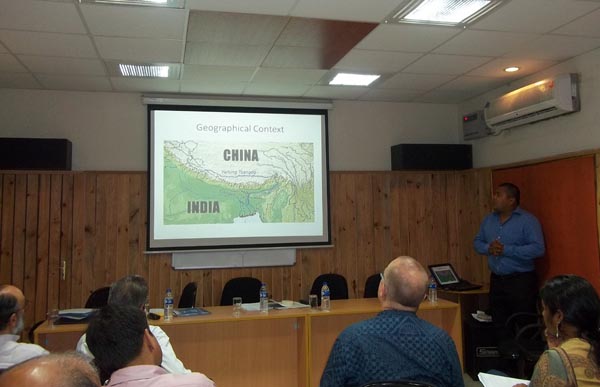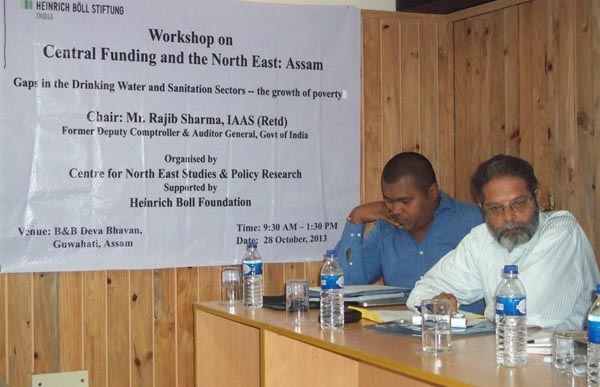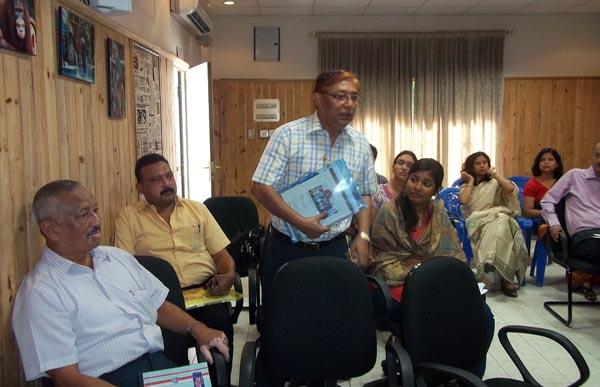The Centre for North East Studies and Policy Research (C-NES) organized a one-day workshop on 28 October, 2013 at Guwahati with a focus on the drinking water and sanitation sector in Assam as a part of a project on “Poverty and funding in the North east: States of Assam and Mizoram” supported by the Heinrich Boll Foundation, Germany. The study examines the relationship between central funds flow to the North East states and poverty. Poverty is multi-dimensional with diverse manifestations and ramification. It is not only income deprivation but also deprivation in other basic human needs like health care, drinking water and sanitation. Over 30 participants attended the workshop including the Country Director of the Boll Foundation Dr Axel Harneit Sievers and Gitanjali More,Programme Coordinator, representatives from the media, related government departments, civil society organaizations and C-NES staff including Managing Trustee Sanjoy Hazarika, Dr D.Das,CEO, Manik Baruah, Associate Programme Manager, Bhaswati Goswami, Communications Officer, Arup Saikia Distrct Programme Officer Boat Clinc Tinsukia, Chandana Borah, Family Planning coordinator and Sangeeta Baruah Programme Assistant.
Sanitation is an issue of human right. We need to bring in better understanding among public and bring in some behavioral changes”said Managing Trustee C-NES, Sanjoy Hazarika in his opening remarks. Highlighting the importance of this study he added “Inspite of so much of central funding to North East India(for sanitation and water supply ), reality is that conditions have not improved. We need to cover the gaps.With this limited study with limited team( two researchers for each state)and resources we have tried to analyze the effectiveness of policy implementation and the public perception” He thanked the Heinrich Boll Foundation for supporting C-NES in this study.
Introducing his organization as a “Green Political Foundation” in Germany Dr Axel Harneit-Sievers,Country Director,Heinrich Boll Foundation said that “We are interested in North East India’s social and political issues including political dialogue and governance issues and were happy to be working with C-NES in an earlier study as well .The North East has become the focal point of our work since the last three years. We have been following this project very closely and hope to learn a lot. Many of the issues we have here are common throughout India but some of them have a NE flavor and approach. So the project will help in pointing out to the issues of governance in the region”.
The workshop was chaired by Mr Rajib Sharma ,former Deputy CAG,GOI who congratulated C-NES for choosing this topic which was not “glamorous” but a very important one as water and sanitation play such an an important role in the dignity of human life. He said that the team has put in a lot of work and needs to be appreciated.Dr Jayanta Madhab,Economist and C-NES Trustee present at the workshop spoke on how relevant such a study was more so in areas where the organizations boat Clinics operate
In his presentation Mirza Zulfiqur Rahman, senior researcher of the project highlighted the need to initiate a holistic process for pursuing a sustained campaign of Information Education and Communication(IEC) which will lead to Behavioral Change Communication(BCC ). He also spoke about the challenges to accountability and transparency in implementation of schemes related to water and sanitation. When his team went for the project,their purpose ,more than data collection was to engage in interaction with the people and hearing their stories, he said. Three districts in Assam- Kokrajhar, Morigaon and Jorhat were the focus districts where 70 households each were taken to conduct the study over a period of 7 months in 2013.
The presentation showed how the conflict scenario in Assam was having an impact on the overall water and sanitation situation and infrastructure and gave incidences of riots and inter community clashes. Ethnic clashes in Kokrajhar in 2012 saw damages to water and sanitation infrastructure in several households as attackers attacked even the sanitary plates. PHED officials are given extortion notices and key water supply and sanitation projects are effected due to prevailing insecurity and conflict situation especially in Kokrajhar. Open defecation is also a reason for conflict in many areas. Many villages did not have an updated BPL list and this creates hurdles in implementing government schemes. The district border villages of Morigaon-Nagong, Jorhat-Lakhimpur, Jorhat-Sibsagar,Jorhat-Golaghat and Kokrajhar-Dhubri get few benefits of government schemes on water and sanitation since district and constituency maps overlap.
The recurrent damage caused by floods which also displaces families have been widely describes by respondents as a primary reason for lack of proper water and sanitation facilities. Respondents in Majuli and Morigaon expressed that their source of drinking water i.e tube wells are submerged in the floods and rendered useless. The least number of toilets facilities were in Kokrajhar disrtrcit and the population growth rate was the highest in Morigaon district which puts pressure on basic services. Jorhat had no traditional open well but had natural springs.
Lack of awareness of government sponsored schemes in the water and sanitation sector was equally responsible along with the lack of coordination between village headmen and members of the Panchayati Raj in their lack of proper implementation. Some respondents spoke about”agents” cheating them . Some were so frustrated that in Morigaon, they even threatened to attack the surveyors. “What has changed for us when we give you so much of our precious time to answer “Some villages in the tea garden sell off materials from Govt schemes to buy alcohol. Again the community latrines concept introduced in some villages of Morigaon district failed as households which give land to construct kept them locked up. Again,the many communities that inhabit Assam compete for the various Govt schemes allocation and it is seen that the dominant community often gets access to resources.
Processes such as communitisation initiatives in Nagaland was important where the PHED takes care of the creation of infrastructure for water supply in the communities and then the communities have to take care of the daily upkeep. Mirza said that community life in NE India is structured and cohesive and is conducive to carry out such community participatory work . Intra NE learning of best practices needs to be taken forward, he concluded.
Mr A Saha, Executive Engineer PHED said that the number of households having toilets shown in the report was much less than the actual numbers He also said that village level committees and school management committees need to be more proactive in maintaining toilets and water supply systems.
Rushabe Himani from Unicef said that Water and Sanitation should be seen as public health issue and the presentation gave him an overview of the problem and brought out pertinent issues. He said that community participation was the most important and though IEC there is a need to involve communities and motivating them with incentives to bring about desired change in community behavior.He spoke about the need to have community relief centres built so that schools were left free for students to carry on with their education. He also highlighted the importance of positive packaging amongst community.
Senior journalist Samudragupta Kashyap from the Indian Express spoke about how behavior change needs a powerful example.
The panel discussion saw active and vigorous discussions among the panelists and the participants where the Chair Rajib Sharma spoke about the importance of cross checking and cross sharing of information between departments.
Manik Baruah and Chandana Borah from C-NES shared their field experiences on disaster management and relief and woman and child issues respectively and how they were related to water and sanitation. John D Basumatary from the Kokrajhar based NERSWN shared his organiations work on water and sanitation in riot hit villages in the district supported by OXFAM including components of livelihood and hand washing.
Report by:
Bhaswati Goswami
Communications Officer,C-NES
